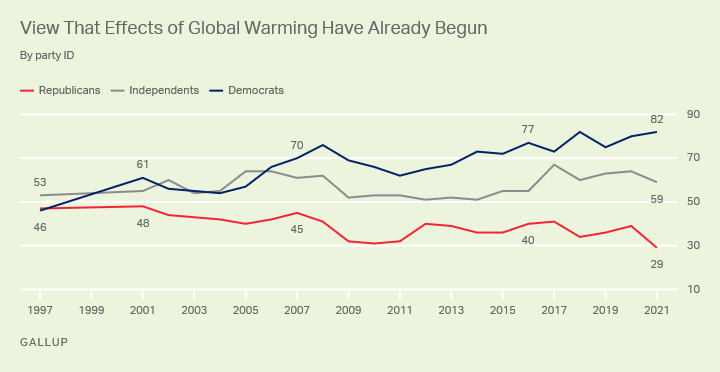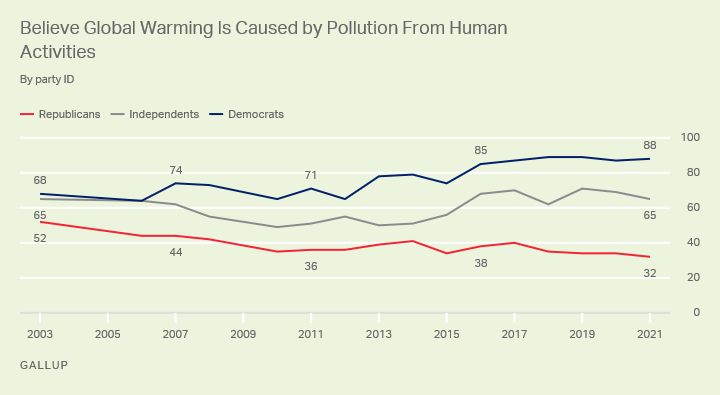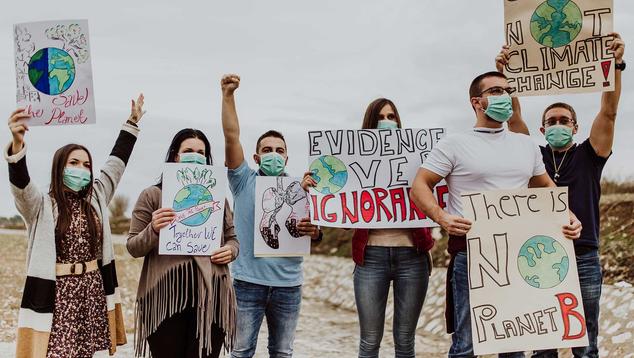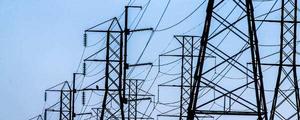Story Highlights
- Six in 10 U.S. adults think effects of global warming are already happening
- 43% worry a great deal about it, with majority worrying at least somewhat
- Party gaps keep widening, with vast majority of Democrats now concerned
WASHINGTON, D.C. -- About six in 10 U.S. adults (59%) continue to say the effects of global warming have already begun to happen, and a similar proportion believe pollution from human activities is more to blame than natural causes for the Earth's rise in temperature over the past century (64%).
Fewer Americans, closer to four in 10, are highly worried about global warming (43%), although another 22% say they worry "a fair amount." More than four in 10 (43%) also expect global warming to pose a serious threat in their own lifetime.
In general, the public's views about global warming haven't changed over the past year, according to Gallup's latest annual Environment poll, and are similar to what they have been each year since 2016. However, this stability masks growing divergence between Republicans and Democrats.

Line graph. Trend from 2001 to 2021 in U.S. views on four issues regarding global warming. The view that global warming is caused more by human activities than natural climate changes was held by 61% in 2001, fell to a low of 50% in 2010 and is 64% in 2021. The view that the effects of global warming have already begun was held by 54% in 2001, reached a low of 49% in 2011 and is 59% in 2021. The percentage worried a great deal about global warming was 33% in 2001, reached a low of 25% in 2011 and is 43% in 2021. The belief that global warming will pose a serious threat in one's own lifetime was 31% in 2001 and 32% in 2010 and is 43% in 2021.
Gallup trends on these measures since 2001 show that Americans' views on global warming were more variable over the past two decades. After dipping in 2004, worry about the issue and the belief that the effects of global warming were already manifest peaked in 2007 or 2008 before hitting new lows in 2010 or 2011. Additionally, after registering 61% in 2001, 2003 and 2007, the percentage believing that pollution from human activity is the primary cause of global warming fell to an all-time low of 50% in 2010.
After 2011, the trends reversed course, and by 2016, Americans' concern about global warming and belief that humans are responsible for it returned to their prior relatively high levels, or rose even higher, and have since remained elevated.
The March 1-15, 2021, poll was conducted at the end of a winter that didn't leave much of an impression on the American public from a temperature standpoint. The proportion reporting that the weather in their local area this winter was colder than usual (29%) is similar to the percentage saying it was warmer (27%), while the plurality (43%) say it was about the same. Americans' views on global warming haven't been closely linked to local temperature patterns in most years; however, the jump in worry about the problem seen in 2016 and 2017 -- rising from 32% in 2015 to 37% in 2016 and 45% in 2017 -- came at the end of two consecutive winters featuring unseasonably warm weather.
This year's results also follow a 12-month period when the COVID-19 pandemic and national politics consumed much of people's attention, and the environment didn't figure as a dominant campaign issue in the 2020 elections.
Nearly Nine in 10 Foresee Global Warming Effects Eventually Occurring
In addition to the 59% of Americans who believe the effects of global warming have already begun, another 10% predict they will start happening within a few years or in their own lifetime. A further 19% foresee the effects affecting future generations, bringing the total who believe global warming will eventually affect humans to 88%. Most Americans across all demographic groups expect this, including large majorities of Republicans (74%) and independents (89%), and nearly all Democrats (99%).
Still, there is variation across groups in the belief that the effects of global warming have already begun, a view that may be more relevant to the propensity for people to be politically active or factor it into their voting. Democrats (82%), adults aged 18 to 34 (72%), college graduates (70%), non-White Americans (66%) and women (66%) are significantly more likely than their counterparts to say the effects have begun.
| Already begun | In a few years/In lifetime | Not in lifetime, but in future | Never | ||||||||||||||||||||||||||||||||||||||||||||||||||||||||||||||||||||||||||||||||||||||||||||||||
|---|---|---|---|---|---|---|---|---|---|---|---|---|---|---|---|---|---|---|---|---|---|---|---|---|---|---|---|---|---|---|---|---|---|---|---|---|---|---|---|---|---|---|---|---|---|---|---|---|---|---|---|---|---|---|---|---|---|---|---|---|---|---|---|---|---|---|---|---|---|---|---|---|---|---|---|---|---|---|---|---|---|---|---|---|---|---|---|---|---|---|---|---|---|---|---|---|---|---|---|
| % | % | % | % | ||||||||||||||||||||||||||||||||||||||||||||||||||||||||||||||||||||||||||||||||||||||||||||||||
| U.S. adults | 59 | 10 | 19 | 10 | |||||||||||||||||||||||||||||||||||||||||||||||||||||||||||||||||||||||||||||||||||||||||||||||
| Men | 51 | 10 | 23 | 15 | |||||||||||||||||||||||||||||||||||||||||||||||||||||||||||||||||||||||||||||||||||||||||||||||
| Women | 66 | 11 | 16 | 6 | |||||||||||||||||||||||||||||||||||||||||||||||||||||||||||||||||||||||||||||||||||||||||||||||
| White Americans | 55 | 9 | 22 | 13 | |||||||||||||||||||||||||||||||||||||||||||||||||||||||||||||||||||||||||||||||||||||||||||||||
| Non-White Americans | 66 | 14 | 13 | 5 | |||||||||||||||||||||||||||||||||||||||||||||||||||||||||||||||||||||||||||||||||||||||||||||||
| 18 to 34 years | 72 | 12 | 9 | 7 | |||||||||||||||||||||||||||||||||||||||||||||||||||||||||||||||||||||||||||||||||||||||||||||||
| 35 to 54 years | 59 | 12 | 20 | 8 | |||||||||||||||||||||||||||||||||||||||||||||||||||||||||||||||||||||||||||||||||||||||||||||||
| 55 and older | 51 | 8 | 25 | 14 | |||||||||||||||||||||||||||||||||||||||||||||||||||||||||||||||||||||||||||||||||||||||||||||||
| College graduates | 70 | 8 | 13 | 7 | |||||||||||||||||||||||||||||||||||||||||||||||||||||||||||||||||||||||||||||||||||||||||||||||
| Some college | 60 | 9 | 20 | 10 | |||||||||||||||||||||||||||||||||||||||||||||||||||||||||||||||||||||||||||||||||||||||||||||||
| No college | 47 | 14 | 24 | 14 | |||||||||||||||||||||||||||||||||||||||||||||||||||||||||||||||||||||||||||||||||||||||||||||||
| Republicans | 29 | 12 | 33 | 23 | |||||||||||||||||||||||||||||||||||||||||||||||||||||||||||||||||||||||||||||||||||||||||||||||
| Independents | 59 | 10 | 20 | 10 | |||||||||||||||||||||||||||||||||||||||||||||||||||||||||||||||||||||||||||||||||||||||||||||||
| Democrats | 82 | 9 | 8 | 1 | |||||||||||||||||||||||||||||||||||||||||||||||||||||||||||||||||||||||||||||||||||||||||||||||
| Percentage with no opinion not shown | |||||||||||||||||||||||||||||||||||||||||||||||||||||||||||||||||||||||||||||||||||||||||||||||||||
| Gallup, March 1-15, 2021 | |||||||||||||||||||||||||||||||||||||||||||||||||||||||||||||||||||||||||||||||||||||||||||||||||||
Party Differences Growing Ever Wider
Even as Americans' views about global warming have been steady over the past six years, the positions held by Republicans and Democrats have increasingly diverged. As early as 1997, Gallup documented differences in the seriousness with which each partisan group took the threat. But Democrats -- who, in 2001, were more concerned than Republicans on all dimensions as well as more likely to believe humans are responsible -- have become almost monolithic in ringing the alarm on global warming. At the same time, Republicans have grown less likely to do so.
As a result, the gap between the percentages of Democrats and Republicans espousing belief in human-induced global warming has swelled on all questions. For example, the gap in the belief that the effects of global warming have already begun has grown from 13 percentage points in 2001 to 37 points in 2016 and 53 points today. Currently 82% of Democrats, 59% of independents and 29% of Republicans think this.

Line graph. Trend from 1997 to 2021 in perceptions that the effects of global warming are already happening, by political party. Democrats' belief in this has risen sharply from 46% in 1997 to 82% in 2021. Political independents' belief has increased slightly, from 53% in 1997 to 59% in 2021. Republicans' belief has decreased, from 47% to 29%.
Similarly, the gap between partisans in the view that global warming will pose a serious threat to themselves or their way of life in their lifetime was 16 points in 2001 and 38 points in 2016 versus 56 points today. Two-thirds of Democrats now consider global warming a serious threat to themselves, versus 43% of independents and just 11% of Republicans.

Line graph. Trend from 1997 to 2021 in belief that global warming will pose a serious threat to oneself or way of life during one's lifetime, by party ID. Democrats' belief in this has increased from 36% in 1997 to 67% in 2021. Political independents' belief has increased from 20% to 43% over the same period, while Republicans' belief has declined from 21% to 11%.
Republicans are a bit more likely to ascribe the rise in Earth's temperatures over the past century to pollution from human activities than they are to be highly concerned about the problem: 32% now say human activity is the cause. But this too has diminished from the early 2000s, when 52% held this view, while the percentage of Democrats assigning humans primary responsibility has expanded from 68% to 88%.

Line graph. Trend from 2003 to 2021 in belief that global warming is due more to the effects of pollution from human activities than to natural changes in the environment, by party ID. Democrats' belief in this has increased from 68% in 2003 to 88% in 2021. Independents' belief has been steady at 65%, while Republicans' belief has fallen from 52% in 2003 to 32% in 2021.
Bottom Line
Although nearly nine in 10 Americans believe the effects of global warming will be felt by current or future generations, prior Gallup polling has found that six in 10 Americans favor dramatically reducing the use of fossil fuels in the U.S. as a strategy for addressing global warming, while 36% oppose it. That aligns with the percentages today who believe the effects of global warming are happening now (59%) and that human activity causes it (64%), suggesting these are the key attitudes driving Americans' political views, not whether they think global warming will become a problem at some point in the future.
In practical terms, the political calculus is very different under Republican and Democratic administrations. Although President Donald Trump, who called global warming "a hoax," received little pressure from his party's base to address global warming, the opposite will be true for President Joe Biden. Not only does Biden himself prioritize the issue, but his political base widely believes the problem is real and personally worries about it.
In pursuing new legislation to deal with climate change, the challenge for the Biden administration will be persuading enough Republican senators to support action to avoid a filibuster. That could be a tough sell, since Republicans signing on to such legislation are likely to face blowback from the Republican base.
View complete question responses and trends (PDF download).
Learn more about how the Gallup Poll Social Series works.




